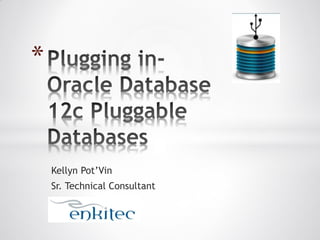Plugging in oracle database 12c pluggable databases
- 1. Kellyn Pot’Vin Sr. Technical Consultant *
- 2. * *Westminster, CO *Oracle ACE Director *Sr. Technical Consultant at Enkitec, LP. *Training Days Director for RMOUG, presenter at numerous conferences, (Next up OOW!) *Database Track Lead for ODTUG’s KSCOPE *Lead author and co-author on couple of books, latest, “Expert Enterprise Manager 12c” from Apress *Current hobby is WIT, (Women in Technology) and O.W.L., (Oracle Without Limits) for RMOUG 2014
- 3. * *Released June 25th, 2013 to the general public *Loads of new features, “Pluggable Database” is the most anticipated and talked about. *Beta program was very successful, ran for over 1 year to test through partners and user groups the features and capabilities of product. *Multi-Tenancy is the new THANG…don’t forget! *Everything is going the way of the cloud- SaaS, DBaaS, PaaS…then DBAs
- 4. * *Concept is familiar to MySQL and MSSQL DBA’s as attach/detach with standard system/user database. *Allows sharing of SGA, background processing and most of data dictionary into “Container Database”, (CDB) *aka “multi-tenancy” offers high sharing, secure containment of databases and lower costs. *Allows easy migration of user/pluggable databases, (PDB) between platforms, releases and systems.
- 5. * *Shared SGA and PGA *Single set of Background Processes *All in Container Database *Pluggable databases, “plugged in” to container database *EM Express Default Installation for Added Support
- 6. * *Ability for resources to be shared and yet security and environment to be separate for auditing and processing purposes. *Exceptionally valuable when consolidating and offering maximum return on investment. *Simplifies administration.
- 7. * *Oracle System dictionary resides in the Container Database. *The SGA and PGA global allocation *RAC and Dataguard compatible *CDB “Root Namespace” *High Consolidation Density by sourcing so much in the CDB! *Where first virtualization and many Oracle Homes created more complexity and upkeep in previous versions of Oracle.
- 8. * *High Consolidation Density *Rapid Patches and Upgrading *Manage Many Database as One *Advanced and Dynamic Resource Management of Shared Resources *Rapid Provisioning and Cloning
- 9. * *“Sealed” off from any other PDB and self- contained. *Read-only copy of CDB data dictionary *Will use service names over Oracle SID for connections. *Pre-12.1 databases can be migrated into PDB *Rman, Dataguard can be at PDB level or CDB level! PDB has granular control over both.
- 10. * *Simple unplug method *Database is simple XML output file. *Plugging in is simple commands/file direction *Simple cloning from one pluggable to another. *Each Pluggable is “self-contained” *Take extra care when utilizing OMF, (Oracle Managed Files) Clone Failures can occur with standard “clone and creation” scripts.
- 11. * *Migrate to new platform *Migrate to new hardware *Migrate and upgrade to new database release *Move database with ease to new system with more resources. *Added enhancement for high availability, as moving is straight forward.
- 12. * *CON_ID=0 is for instance level. *CON_ID=1 is for the Container database *CON_ID=2 is for the seed database *CON_ID>1 is for pluggables
- 13. * *One word: CON_ID Select name, con_id from v$active_services where con_id !=1; *Utilize many of your same queries, but add into where clause, “CON_ID=<con_id for PDB>;” using the v$/GV$ views
- 14. * *ALTER SESSION SET CONTAINER = pgtst12c2; *Show statements: *And once you have “altered” your session-
- 15. *
- 16. * Same V$ query you’d use to look at datafiles in previous versions, just added the con_id to the where clause!
- 17. * *These replace the DBA Views when you move from single instance to Pluggable database. *Easily replaced, comfortable scripting, just replace your DBA with CDB: *Yes, there are over 900 new CDB views… *Two PDB views at Container level
- 18. * *All data is shown with subcategory of what PDB derived from in main AWR report.
- 19. * *This includes Datafiles and Objects
- 20. * *“Top Container” *Very little data broken down by PDB at this time:
- 21. * *Marketed as replacement for DB Console *Available to PDB’s post configuration of the DBMS package (DBMS_XDB_CONFIG.SETHTTPPORT). *High performance tools available with no overhead to database. *Great tool to grant to developers if you aren’t willing to grant access to EM12c. *Has own entry in listener.ora, (yes listener must be running to connect) *Uses FlashPlayer currently, but will be rewritten soon!
- 22. *
- 23. *
- 24. * *Virtualbox has a lot of support from Oracle *VMWare is the most trusted. *Images easy to locate. *Shortcuts can save you a lot of time.
- 25. *
- 26. * *Call for Abstracts are Open! *Best Grass-roots Conference in the US!! *February in Denver, CO.
- 27. *

